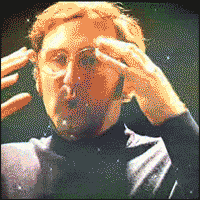Let's talk about infinity! (Not your average math teacher)
Since I joined steem, I've very much enjoyed posts by @complexring, but I've seen very few others to really dive into a mathematical topic so I thought I share you some (simplified) notions about a mathematical subject that I'm very fond of! Infinity Theory deals with results that hold in the infinite. These are results that are very difficult to comprehend, but nevertheless they form the backbone of virtually all the statistics that most people encounter. Maybe someday, if steem grows and we gather a large community of academia and enthusiasts, I might be here to share you some of the important results, but today I'll start introducing the notion of infinity, albeit in a simplified anecdotical way.
Two things are infinite: the universe and human stupidity; and I'm not sure about the universe.
That's Einstein. He was a great mathematician, and like me he was keen on the concept of infinity. In 1917 he proposed in his paper Cosmological Considerations in the General Theory of Relativity that the universe could be finite in space and infinite in time.
We all know that the universe is big but apparently it's larger in time
That's a weird thing to think about. How can we compare spatial units with time units? Mathematicians are less concerned with actually understanding something. We just write down the equations and make it work. My math professors once told me that a good mathematician can proof anything, and that the best mathematicians understand a few proofs really well. In other words, the real challenge we face is to actually understand the things we prove.
So let's try to understand a little bit more about infinity
Infinity is a difficult concept. We can imagine large numbers. We have ten fingers, and it's not so difficult to extend that notion to larger numbers, say a thousand or a million. A million is already hard to comprehend, though we all know that some people have more than a million dollars on their bank.

this guy is probably a millionaire
So what about a really big number? Googolplex is the number 10^googol, or equivalently, 10^10^100, so big that if you would write it out in full, it would take all the space available in the universe and you wouldn't be finished. But that's not infinity. The only thing we can really say about infinity, is that it is something without any bound, it is larger than any number. It is unimaginably large!
Some infinities are bigger than others
Well that's weird. We can't even imagine infinity, but apparently there are multiple types of infinity and some are bigger that others. This is something that one can only state mathematically, it's very difficult to really understand why these things happen. In fact, I'm referring to a Hypothesis of Cantor, and it's actually not proven tough most mathematicians would agree it to be a very reasonable statement at the least. The hypothesis states that there are infinite round numbers, and infinite digit numbers, though there are more infinity of the latter.
There is some intuition (though it is false guidance), the integers are a proper subset of the rational numbers, which themselves are a proper subset of the real numbers. Intuitively one might say that therefore there should be more rational numbers than integers, and more real numbers than rational numbers. However at the same time we started from the notion that all three are infinite. So that's paradoxical reasoning. Cantor's statement was that there are infinite integer numbers, like -10 and +10.000.000, but that you can always pick a number in the set of integers, like the googolplex number, and you can start counting from 0, and reach your picked number in a finite amount of time. The integers are countably infinite. However the real numbers, that is the collection of all digit numbers like Pi, are all so lengthy that you can not even go from the first to the next real number and finish counting in a finite amount of time. All the real numbers are endless, or infinitely lengthy (as of 2015 we know about 13.3 trillion digits, but we are not finished). The real numbers are therefore uncountably infinite, hence the collection of real numbers is larger than the countably infinite integers.

that's how my students look when they try to understand results relying on infinity theory
Now it get's weird
It turns out that if you follow this so called continuum hypothesis, it also holds that the collection of real numbers between 0 and 1, is evidently a subset of all the real numbers but at the same time the same size as the collection of all the real numbers. In fact, the collection of all the real numbers between any two integers are the same size independent of the integers chosen, and bigger than the collection of all integers, while all of them are infinitely large.

Mentioning the so called continuum hypothesis usually triggers very interesting talks. The kind of talks that you have in an elevator, and you forget which floor you we're going to, completely oblivious to any others that enter and leave the elevator because you are so immersed in conversation. I wasn't talking about myself, well maybe I did..
Disregarding whether you believe it to be true, the concept is intriguing, and it is safe to say that the human mind is not made to understand these notions very well.
About me
I studied geology, only to conclude that the problems in the field of research did not really intrigue me as much as they did as when I was a kid looking for dinosaur bones in the garden. I had many courses in economics, specifically about environmental aspects and resource management. After my degree, I self-studied economics and statistics and was accepted to do a studies in economics. I became intrigued with econometrics, and wrote a thesis about multidimensional models and proved a few Theorems about asymptotic properties of very complicated feedback models. I now work at a university and focus on the mathematics behind asymptotic theory. Specifically, I investigate conditions under which models that have no closed-form solution, have desired properties in the infinite such that we can use numerical methods to approximate means and standard deviations knowing that the numbers that we find actually have a meaning.
I have always found the concept of countable and uncountable infinity fascinating (When I originally encountered the concept, they were reffered to Aleph Zero and Aleph One). It has some interesting implications, especially when you start looking at probability. When dealing with uncountable infinities, you are forced to use calculus and approximations.
Of course, thee is a question as to whether uncountable infinity is a useful description of time and space, since they both seem to be quantified at Planck levels. (Therefore they may be considered countably infinite)
(Disclaimer: I have a degree in Physics and Maths, although I am very rusty with both)
Could you tell me more about an uncountable infinity? Seem very odd to me that there could be one.
If you look at the set of real numbers, if you take a range of real numbers (for example all the real numbers between 1 and 2), that set will still be infinite (since there are an infinite amount of numbers between one and two. So real numbers are uncountably infinite.
If you look at the set of integers (1,2, 3, 4....). A range of numbers in that set will actually only be a finite subset (for example, the range between 3 and 5 will only contain 3 elements. So, integers are countably infinite.
There is actually more to the definition, but this is the simplest explanation that makes sense to me.
Thanks for trying to explain it to me, but unfortunately (for me) I'm still confused. It seems to me that the set of real numbers between 1 and 2 is infinite only because the number of digits to the right of the decimal point can be increased arbitrarily so that the set is countably infinite in terms of the number of digits required to represent it. I guess I am assuming (perhaps wrongly) that if an infinite set is composed of a number of countably infinite sets it itself is countably infinite. (See, I told you this wraps me around the axel.) And, of course, my thinking could be totally wrong. If you feel up to it, please teach me more.
I upvote U
Very interesting! Got me to sign up
I minored in mathematics in college, so I did not have to come to grips with ∞ in a serious way. Nevertheless, while I can subscribe to most of the protocols that mathematicians have attributed to ∞, the concept that one ∞ can be bigger than another is preposterous to me. Thanks for an interesting article.
Well the story around the continuum hypothesis has certainly not come to an end! Its provability was included by the great mathematician David Hilbert in his list of the 23 great open questions of mathematics in 1900. So far, the great Kurt Gödel and Paul Cohen have wrapped their heads around it along with many others, and the proofs that are currently on the table is that the continuum hypothesis is actually independent of Zermelo–Fraenkel set theory, which is the collections of axioms underlying modern theory about collections of numbers. Cohen was awarded the Fields Medal for it, which is regarded a bigger achievement than an Nobel Price by many. Independence of ZFC implies that both proving as well as disproving the continuum hypothesis is impossible within the current axiomatic system. An astonishing conclusion to me!
This is wild conjecture on my part; just intuition, but "both proving as well as disproving the continuum hypothesis is impossible within the current axiomatic system" suggests a portal to an unknown dimension. Mathematicians have developed a powerful sytem that mirrors our reality on an abstract yet practical level; counting, calculus, probability theory etc. However, when something is shown to be neither proveable nor disproveable it reminds me of Schrödinger's cat and the paradoxes of the quantum world. When our mathematical axioms fail a portal to a new reality opens before us.
Infinity is an interesting concept, one that usually wraps me around the axel, but the most interesting explanation of infinity that I have heard is found in the hymn Amazing Grace.
Many religions have interesting concepts related to infinity, personally I'm intrigued very much by how the Hindus viewed infinity. In fact "Vishnu", one of the better known gods, means infinity. I would be very interested in hearing your interpretation of Amazing Grace and the concept of infinity :-)
See my reply to tralawar above (or whereever it is -- I didn't realize it moved). Essentially my concept of infinity is that it is a never-ending supply of something countable like days, or buildings, or ideas; and no matter how many you count you can always count one more. That is, any concieveable number that might be the boundary of infinity can always have one added to it to prove that it was not the boundary. Infinity has no boundary.
Care to explain?
"When we've been there ten thousand years, bright shining as the sun, we've no less days to sing God's praise than when we've first begun."
Fascinating topic. I enjoyed it immensely.
Thank you! Hope I've challenged some smart minds in a pleasant way!
That is approximately also how we would model "spatial time series" in econometrics, and is in line with the an interpretation of the built up of information within the Information Theoretic framework. I mostly think in the same way when I'm working!
I just realized that this was also an #introduceyourself post. Welcome! You post hit the nail on the head when it comes to my point by adding awesome content in this post I wrote. I hope it picks up some more upvotes as a prime of what a #introduceyourself should be.
Thanks a lot! I've been hanging around for a bit and thought I should write up something nice for everybody. When I get the inspiration, I will write something new :) Maybe about timeseries econometrics as many here seem to be enthusiastic about trading and predicting the course of steem.
@chrishronic if you like sci-fi I wouldn't mind a little support on this post I just wrote.
Great article! Very much enjoyed the read
wellcome
Thanks! Don't know why you received a down vote for that so I did my best to nullify. Cheers and see you around!